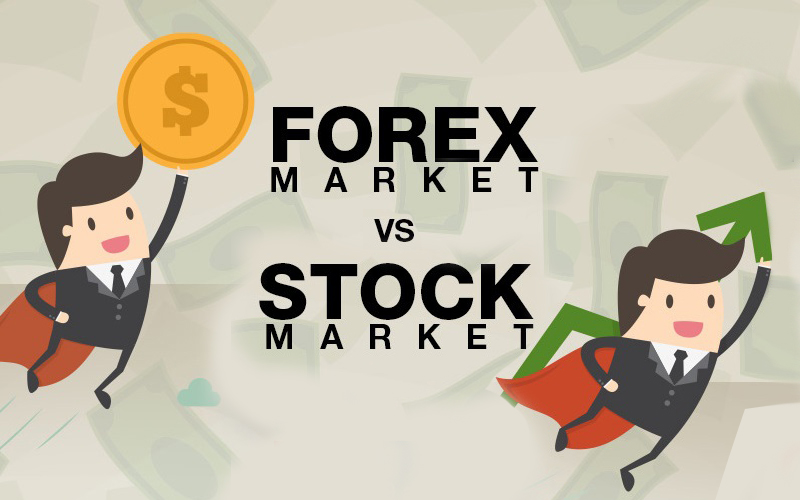Forex involves the act of buying and selling a currency against another. It is one of the most widely traded markets globally, with a 5 trillion USD volume in exchange each day. One can trade currencies 24 hours a day from 5 p.m. EST on Sunday until 4 p.m. EST on Friday. In the FX market, two currencies are traded in pairs. Hedge funds, retail traders, investment firms, banks, central banks, commercial companies, and investors are the prominent participants in the foreign exchange market.
A stock, equity, or a share market is where people buy and sell a publicly listed company’s shares. A stock can only be purchased or sold in case if it is available on the exchange. One can take two positions when trading equities, i.e., a buy where you get a stock at low merit and then sell it at a higher price. The other is shorting, in which you take shares as a loan and sell them, and afterward, when the value of the asset goes down, you buy back the equity and return them to the exchange. By taking a peek at its share cost, you can monitor the worth of a company.
Comparing forex and stock market
We can contrast both markets with the following significant differences.
| Forex | Stock | |
| Volume | Roughly 5 trillion USD | Roughly 200 billion USD |
| Liquidity | High | Low |
| Timing | 24/5 | 8 hours 5 days a week |
| Fees | Low | High |
| Focus | Wide | Narrow |
| Leverage | High | Low |
Volume and liquidity
Volume and liquidity go hand in hand with one another as they are closely related. Forex takes the lead when it comes to volume as it is one of the most heavily traded markets. The overall focus is fixed more towards major pairs in forex that contribute to a bigger daily transaction of 5 trillion USD. High volume and liquidity have the benefits, as stated below:
- Getting in and out of your positions is easy.
- A better price is guaranteed when you want to get filled in on a trade.
- Lower spreads, transaction costs, and fees are present. The commissions by a broker while trading stocks can start from 0.04 percent, whereas for forex, you may only have to pay the difference between the bid and ask that is one pip in most cases.
Trading hours
Another one of the considerations that you may have to look over is the number of trading hours of each instrument. Forex is much more flexible in this regard as the market is open 24 hours a day from 5 p.m. EST Sunday through 5 p.m. EST Friday, as stated before.
Stocks are available to trade at different times depending on whether the significant indices open their exchange. The US share market opens at 9:30 a.m. to 4 p.m. Eastern time only on weekdays.
Due to the recent upgrades in the infrastructure of trading equities, one may trade during pre and post-market hours; however, institutional traders can access it only.
Margin and leverage
One of the significant advantages that forex traders tend to get is the amount of leverage at one’s disposal. In the United States, investors can have up to 1:50 on currency trading, while stocks are limited to 1:2.
One is forced to sign up with prop firms for working on equities, which removes the lucrative benefits of retail trading. It would help if you kept in mind that a high leverage amount can also lead to margin calls.
Volatility
Volatility is a measure of price fluctuations. Forex is prone to more short-term price fluctuations; i.e., it is extra volatile. The stock market has fewer movements, so it is better favored by traders who prefer stability. It does not mean that it is not volatile at all. Any political news, economic change, and natural disaster can also significantly impact equities that quickly show big price differences.
Fluctuation in the value of an asset does have great benefits as one can gain profits in a short time; however, it is also quite risky.
Traders focus
When trading the stock market, a trader is more focused on narrow factors that affect the company’s price. This may include its debt levels, earnings, cash flows, etc. Broader trends may also come to your attention, but the elements which directly affect an asset are more concerned.
In forex, the focus is much more comprehensive as the traders take a peek over macroeconomics that revolves around a currency. When you are trading a pair, you have to look at the fundamentals affecting both economies, not just one. Unemployment, GDP, inflation, interest rate, etc., are factors under consideration that also influence the charts’ technical analysis.
How can you transition between forex and the stock market?
It is essential to know the difference between forex and stock in case you try to move from one. Having in-depth knowledge about fundamentals, trading hours, volatility, and leverage is a must before you start. If you are a technical trader, you may have to learn a new strategy. Risk management and psychology are mostly and depend on what type of person you are.
End of the line: Which one should you choose?
No doubt, with the advance in infrastructure and technology, everyone can participate in both forex and stock trading. Your selection amongst the two will generally depend on your goals, risk tolerance, trading style, account size, and of course, personal preference. A busy man may not sit 8 hours a day trading stocks, and he may prefer something long-term. Both markets welcome swing traders, but the swaps and fees in shares may hurt you, and FX is prone to swings. The definite answer lies in researching and comparing the differences to select which one is the best option for you.
